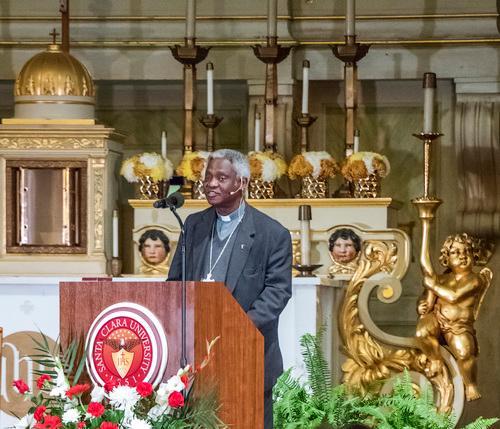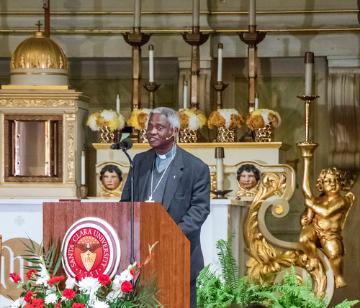
Laudato Si' as a “Charter Document” for Santa Clara University
From the moment it was issued last year, Laudato Si' has served as a sort of charter document for elevating and moving Santa Clara University forward across all disciplines in our commitment to climate justice. It continues to be a great unifying document for our University: offering a wisdom to us that this commitment must be truly inclusive of every unit at the University, in the same way that Pope Francis’ call for an integrated ecology speaks not just to those engaged in sustainability, but to each and every human inhabitant of our common home.
In his 2009 inaugural address, Santa Clara University President Rev. Michael E. Engh, S.J. made a strong case for the values at the core of the future Laudato Si', when he said that he wanted Santa Clara to be a center for environmental justice:
He remarked, “In our ethical reflection we consider the needs of our world. We see with increasing clarity the fragility of our planet: the depletion of the soil, the destruction of its forests, and the pollution of air and water….And we might ask ourselves: Who hears the voice of the needy and listens to their concerns about exploited lands and economies? Who is the voice for the defense of the assaulted world? Who trains the leaders we need to understand the intricacies of biodiversity and who are also equipped to discern the ethical dimensions of their decisions? Who, indeed?”
Naturally, Pope Francis' teaching document on those very questions has sparked swift enthusiasm and planning on campus over the last year:

Cardinal Turkson addressing an audience at Santa Clara.
- Conference on Climate Change: Nascent plans for a conference on the moral, ethical, economic and personal dimensions of climate change quickly came into focus and became centered around Laudato Si'. We were delighted to learn – a few weeks before it was issued – that Cardinal Peter Turkson of the Pontifical Council for Justice and Peace had accepted our invitation to speak on the document he had helped to write. All of the speeches from the two-day conference in early November – called Our Future on a Shared Planet: Silicon Valley in Conversation with the Environmental Teachings of Pope Francis – have been recorded and posted online.
- Faculty Reading Groups: Last fall, faculty from all across campus (e.g. business, law, arts and sciences, and environmental science) formed several interdisciplinary reading groups to read Laudato Si'. Economics professor Helen Popper called the encyclical “a joy to read,” especially for an economist who understands the complexity of promoting both progress and preservation. “I was impressed with the warmth and thoughtfulness of (Laudato Si'),” she said, as well as the rich history of encyclicals and Church teaching.
- Lectures: Throughout the fall, campus and outside experts gave additional lectures on the issues addressed in the document, including law professor Tseming Yang, who gave a very well-attended lecture on the Paris climate talks, and Catholic Relief Services CEO Carolyn Woo, who gave a talk entitled “I Am Climate Change.”
- Teaching resources: A teaching module was created by the Markkula Center for Applied Ethics, for use by any professor looking to initiate discussion around Laudato Si' in the classroom.
This summer, from June 15 – 17, the Center for Professional Development in the University's School of Education and Counseling Psychology will offer a three-day workshop featuring "TedTalk"-style lectures for Catholic high school teachers who want a more formal understanding of how to incorporate Laudato Si' into their teaching.
- Student classes formed or revised for Laudato Si': Santa Clara professors incorporated Laudato Si' into more than a dozen undergraduate courses last year. For instance, an advanced modern dance class devoted an hour to a dance performance during which the audience read Laudato Si', followed by a reflection period. The religious studies class, "Christianity and Politics," featured a session on “Laudato Si', Global Christianity and the Politics of Climate Change,” which focused on the Philippines. And the philosophy class, “The Disposable Society,” also incorporated tenets fromLaudato Si'.
In addition, a new seminar class, created by Santa Clara’s three Environmental Ethics Fellows, explored Laudato Si' from economic, environmental and ethical perspectives, and featured several guest speakers.
- Additional events: In early March, Santa Clara’s Miller Center for Social Entrepreneurship put on a standing-room-only event featuring famed oceanographer Sylvia Earle and a showing of the movie Racing Extinction. And on April 16th, Campus Ministry and the University’s Ignatian Center hosted an Ignatian Day of Reflection on “Climate Justice and Sustainability.”
A repository of the many events and resources focused on Laudato Si' at Santa Clara can be found at scu.edu/ourcommonhome.
By David DeCosse and Deborah Lohse
David DeCosse is director of campus ethics programs at Santa Clara’s Markkula Center for Applied Ethics. Deborah Lohse is the University's assistant director of media relations.